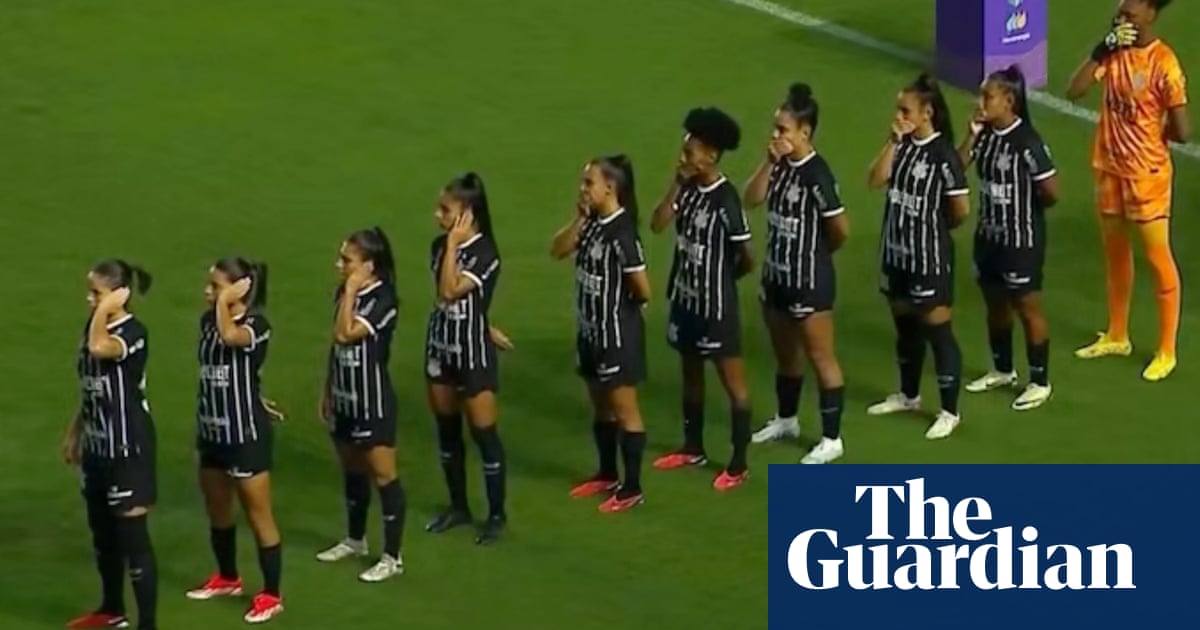
Santos found themselves at the centre of controversy this month when the Brazilian football club decided to bring back their former manager Kleiton Lima seven months after he had been accused of moral and sexual harassment by players in last year’s squad.
All eight matches in the fifth round of the national league saw protests against Lima, who left the club again after one game versus Corinthians that saw their opponents cover their ears and mouths during the Brazilian national anthem. Lima had been at Santos since 2022 and left the club in September 2023 after players complained about his conduct through 19 anonymous letters, published by the Brazilian news website GE.
Players claimed they were subject to inappropriate language, verbal aggression and public humiliation. Some letters alleged “inappropriate touching” and disrespectful comments about players’ bodies. Some were uncomfortable because he would not wear underwear, “allowing his genitalia to be visible through the uniform”.
The letters were addressed to the former club president Andrés Rueda and women’s football supervisor, Aline Xavier. Lima has consistently denied the allegations.
Seven months after the accusations came to light, his return to the club led to protests and criticism, with players at some clubs highlighting No 19 jerseys – a reference to the number of letters of complaint.
Some players also used posts on social media to insist they had not been part of any investigation that may have proved him innocent.
Lima’s return lasted a little over a week. After the protests, he told ESPN Brasil that he had received death threats and requested temporary leave to ensure his family’s safety. The club president, Marcelo Teixeira, who won elections in December, said Lima was brought back after recommendations from the women’s football department. “His return was based on the fact that we don’t have any proof. Most of the current squad were not here last year. I listened to the players and my team. All of the current players supported it.”
While the club claim they conducted an investigation and found no evidence of misconduct, former players tell a different story. They claim they had reported Lima multiple times before sending the anonymous letters to the club’s president and supervisor. Some players reported anxiety and one said she had suicidal thoughts. At the end of the season, most of the squad was let go.
Players who reported Lima in 2023 and are at other clubs told Moving the Goalposts on condition of anonymity that they felt punished by the club for speaking up. When Lima left Santos in September, he denied the accusations and offered his resignation. Santos announced that he was no longer the manager and fired most of the staff: the assistant manager, fitness coach, performance analyst, goalkeeping coach, massage therapist, two physical therapists and a psychologist were all let go.
According to the players, the staff had supported them, and after they left, they lost access to any psychological support from the club. Santos have not responded to requests for comment.
One player said: “They removed everyone that was there to give us psychological support and relief. They knew we needed it and still didn’t provide any. I was having a very difficult time and was having trouble getting through a training session without crying, something that had never happened to me before. I was driven to a panic attack in the middle of training and the director knew it. It almost seemed as if this was our punishment, the price to pay for coming forward and speaking up. Our teammates were each other’s only support.”
After returning to Santos this year, Lima – the Brazilian women’s national team coach between 2008 and 2011 – spoke up against the allegations. In an interview with ESPN Brasil, he said he had no idea players were dealing with anxiety or depression in his squad. He also said that demands were part of the job, but he never crossed a line.
“It is a really fine line. The manager is responsible for demanding better performance every day, right? Sport-wise, athletic-wise, in taking care of themselves, training, games, performance and results. But I’ve never humiliated anyone,” he said.
However, a former Santos player, speaking anonymously, claims otherwise. “If his goal was to improve our performance, it did not work. We couldn’t perform the way we wanted to. I saw that he was not contributing to our performance. On the contrary, he was hindering it.”
During a press conference this month, Thaís Picarte, the women’s football coordinator – who joined the club in January – classified the claims as “weak”. Although she was not at the club during Lima’s previous spell at Santos, she said: “The club investigated every claim, there was an administrative process, and I, as coordinator in the department and as a woman, investigated not only with people who are here but also with players who left the club. Nothing was proved. On the contrary, the claims were weak, fragile and put an unnecessary stain on the club’s history.”
According to the players, when trying to report the manager last year they were allegedly told to follow club protocol and report to internal affairs only, rather than filing a police report. They hoped for a thorough investigation but instead were called to a meeting with Xavier, Alexandre Gallo (the club’s director of football) and a lawyer.
“The letters were a last resort, and we were still silenced and judged, called liars and manipulators. We were never heard. They only tried to find out who wrote the letters to punish us,” one player said. Another added: “Multiple athletes told their stories, cried and recounted experiences that could be considered moral or sexual harassment. [After the meeting], all the athletes agreed to follow the club’s rules, be patient and not come out publicly to ruin ours or the club’s reputation unnecessarily.”
The reports backfired. Even though Lima did not attend this meeting, he told ESPN Brasil that witnesses revealed one of the authors. He then filed a police report against her for slander and defamation. The criminal process is still taking place under the secrecy of justice. “I wanted them to go to the police station and say what happened because the police would investigate. The accusers have to have proof. How am I going to prove that I didn’t do it?” he asked. “I’m the one who went to the police since the beginning. They are trying to frame me.”
After Lima’s return, players felt frustrated and began speaking to the media anonymously. They recalled alleged events that happened last year and were not mentioned in the letters, claiming these were all evidence of Lima’s inappropriate conduct.
“One day, he arrived at training and told me he was tired because he had sex with his wife all night,” one of them told ESPN Brasil. “I had my back turned to him on the pitch and he touched my buttocks. He said: ‘Didn’t you say you were going to lose weight?’” said another.
According to the players, their complaints were dismissed. “When we brought these issues up, [Xavier] would say we were complaining too much and we needed to adapt to his personality. It was becoming unbearable, so that is why we decided to use the letters,” said one player. “We thought that if everyone individually wrote their experiences down, the directors could not blame the problem on one or two complainers. They would have to take us all seriously and not ignore our voices,” said another.
The players feel that the Kleiton Lima issue is just one example of how the club has a sexist culture. Robinho, one of the club’s most famous academy products, was convicted of participating in a gang-rape of a woman in Italy in 2013. In 2020, he was signed by the club, but they cancelled his return after heavy criticism. In March, he was arrested and is serving a nine-year sentence in Brazil.
The players feel that not being heard is another symptom of that environment. After the protests, Teixeira admitted that the club made a mistake in bringing Lima back. “[Him leaving again] was mutually agreed upon, especially to protect this professional and his family,” he said. “We don’t want to cover up for the manager and we don’t have anything against the players. We want to be exemplary [in this investigation]. It’s not enough to speak up anonymously, we will not settle for that. We want brave reports and brave measures.”
Players, however, fear that they will suffer retaliation for reporting, even after they have left the club. That is why, when speaking to the media, they choose anonymity. “I have been told that it is better to keep quiet and never put my name behind any claim because it will follow me to any club. It will be much harder to sign a contract and be trusted by the coaching staff in any club if I become known as ‘someone who reports’,” said one. “My biggest concern is that these clubs continue to disregard the mental and physical health of athletes that play for them. This showed that even through formal and thoughtful means of reporting, we are not protected.”
Get in touch
If you have any questions or comments about any of our newsletters please email moving.goalposts@theguardian.com. And a reminder that Moving the Goalposts runs twice-weekly, each Tuesday and Thursday.












